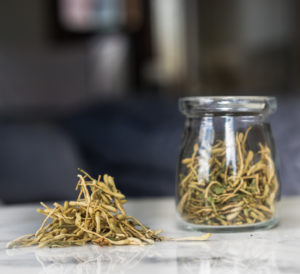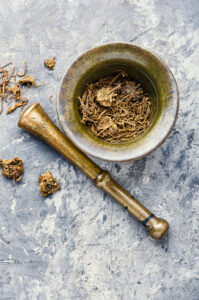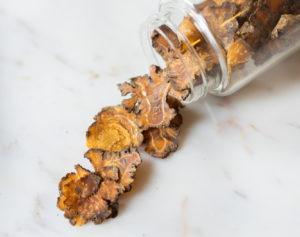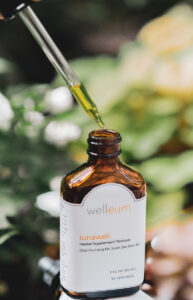FEELING ANXIOUS?
Valerian Root Might Be Your New Best Friend

Find yourself feeling anxious lately? You’re not alone. Anxiety affects millions of people worldwide and can range from occasional and mild to nearly debilitating. While we know there are many factors that can contribute to anxiety, it is still a heavily studied and widely misunderstood affliction. As a condition that has both mental and physical impacts, many look for solutions to help reduce or eliminate these symptoms.
While Western Medicine has focused heavily on pharmaceutical treatments, Eastern cultures have practiced natural methods for years. One common go-to is Valerian Root, but why is that and how is it used?
What is Valerian Root?

Valerian is a tall flowering plant that is native to regions of Asia and Europe. As such, valerian root comes from the base of the plant that anchors it into the ground. This root can be extracted in several ways and used for medicinal purposes.
Valerian Root has been used in Eastern medicine since ancient times, with references to the herb and its benefits appearing in both Hindu and Middle Eastern literature. The Chinese have long used valerian to alleviate pain, slow bleeding, and induce calmness in anxious patients. You might not hear about it in the Western world as much, as many doctors are more likely to prescribe chemical compounds such as Xanax or Klonopin for anxiety. Still, it has made its way into the Western world and alternative practitioners use it regularly for their patients.
How Does Valerian Root Help Anxiety?
 Valerian root has multiple compounds that can contribute to calmness and the reduction of anxious sensations. This includes isovaleric acid, valerenic acid, many essential oils and a number of antioxidants. These compounds work together to regulate the chemicals in your brain and nervous system.
Valerian root has multiple compounds that can contribute to calmness and the reduction of anxious sensations. This includes isovaleric acid, valerenic acid, many essential oils and a number of antioxidants. These compounds work together to regulate the chemicals in your brain and nervous system.
One main regulator of your nervous system is GABA, or gamma-aminobutyric acid. When your gamma levels are stable, you feel calm and steady. But when GABA levels are low, your nervous system starts to fire off more impulses, and you may feel anxious, jittery, amped up. All of these symptoms can lead to low-quality sleep and further exhaustion.
Valerian root helps with GABA levels because the chemical compounds prevent GABA from being broken down in the brain. This helps to stabilize your GABA levels and keep you feeling calm and tranquil.
The antioxidants also work in the brain to slow down activity in areas that are associated with fear and intense emotional responses. This means that you can face new situations without being overly stimulated.
Taking valerian root has also been shown to stabilize levels of serotonin and provide sedative effects. This can regulate your mood and decrease feelings of fear and uncertainty.
How to Take Valerian Root
 There are many forms of medicinal valerian root. In Western medicine, it is often ground up and sold in pill or tablet form. Traditionally, this is not recommended as the constituents are not preserved before they oxidize. Oxidized valerian can be agitating to some, so you can also extract valerian in alcohol and dry it out. This makes it suitable for most people.
There are many forms of medicinal valerian root. In Western medicine, it is often ground up and sold in pill or tablet form. Traditionally, this is not recommended as the constituents are not preserved before they oxidize. Oxidized valerian can be agitating to some, so you can also extract valerian in alcohol and dry it out. This makes it suitable for most people.
While pills have also been available in recent years in the East, the more traditional method of consuming Valerian Root is to make a tea. You can do this by boiling water and soaking 2 or 3 grams of the dried root for 10 to 15 minutes. If using Valerian Root to promote healthy sleep, take it approximately 2 hours before bedtime. The older and smellier the herb, the less effective it is.
Is Valerian Root Safe?
While Valerian Root might not work for everybody, there are few negative side-effects, and the ones that have been observed are generally mild. They include headache, dizziness, and upset stomach.
Other Herbs for Anxiety

While many people swear by Valerian Root for anxiety relief, there are many other herbs that have been used for thousands of years with similar effects:
- Chamomile – Chamomile is popular for its calming effects, and you can likely find it in tea form in any major supermarket. Chamomile supplements are also widely available.
- Kava – This Pacific Island pepper has long been praised for its strong sedative and pain-relieving effects. Like chamomile, it is generally consumed as a tea or an extracted fermented beverage.
- Lavender – Lavender has become popular in recent years with the increase in the popularity of essential oils. Many people report feeling relaxed when using lavender oil for aromatherapy, but it can also be taken as a tea.
- Passionflower – Passionflower is used to treat restlessness and anxiety, and some people report feeling effects as strong as pharmaceutical drugs without the negative side effects. It is best for people whose mental chatter keeps them from falling asleep.
- Szechwan Lovage – Used to circulate qui, when used in combination with other herbs, this herb helps to reduce racing thoughts and improve clarity in the mind.
Multi-Herb Combos
 Herbal formulas with a combo of herbs have been used in Traditional Chinese Medicine for thousands of years. As with all things in Eastern medicine, the goal is to help find balance. Chai Hu Long Gu Mu Li Tang and Suan Zao Ren Tang are two such formulas which aim to help you chill out! One easy-to-take option is this tincture which contains a modernized version of both formulas.
Herbal formulas with a combo of herbs have been used in Traditional Chinese Medicine for thousands of years. As with all things in Eastern medicine, the goal is to help find balance. Chai Hu Long Gu Mu Li Tang and Suan Zao Ren Tang are two such formulas which aim to help you chill out! One easy-to-take option is this tincture which contains a modernized version of both formulas.
Is Herbal Treatment Right for Me?
There is no one-size-fits-all solution for treating anxiety or feelings of anxiousness. Every person is different and will experience varying levels of effectiveness. However, you can rest assured knowing that herbs such as Valerian Root have been used in Eastern medicine for thousands of years, with few negative side effects. Even if it doesn’t relieve all your anxiety, it is safe to try.
Many people simply do not like the feelings or side effects they get from their chemical prescriptions, and a good number of anti-anxiety drugs can be addictive and harmful to your body. If you want to avoid going down that path, herbal options may just be the answer. Speak with one of our Eastern medicine experts who can help determine which solution is the best one for you.
Newer
Why You Can’t Sleep And How Traditional Chinese Medicine Can Help
Older
Natural Cold Remedies You've Never Heard Of
Comments (0)
Leave a reply
You must be logged in to post a comment.




